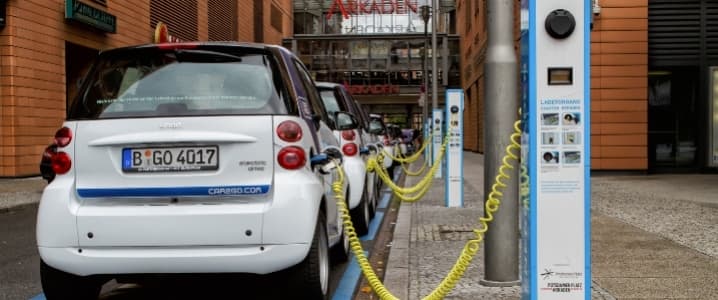Chevy is about to release its all-electric Bolt. Tesla will soon put its Model 3 on sale. More than a dozen additional EV models will be launched in the next few years. Battery costs are falling fast, making EVs close to becoming cost-competitive with the internal combustion engine. Yet, oil demand will continue to rise, at least for another 25 years.
That conclusion comes from the International Energy Agency, which does not see oil demand reaching a peak until at least 2040. In its recently released World Energy Outlook, the IEA projects only tepid growth for EVs, with the EV stock rising from 1.3 million in 2015 to a cumulative total of 150 million by 2040. That would only displace a meager 1.3 million barrels of oil per day (mb/d), which to be sure, would have some price impact, but it would not represent any sort of existential threat to the oil industry. In fact, the IEA sees oil demand continuing to rise, jumping by about 13.5 mb/d between now and 2040, rising from 94.1 mb/d to 107.7 mb/d.
EVs have made substantial progress to date. Battery prices have plunged by more than two-thirds since 2010. EV sales continue to grow, up 20 percent in the first half of this year in the EU compared to the same period in 2015, and up 130 percent in China. Charging stations have climbed around the world, jumping from 110,000 in 2014 to 190,000 a year later.
Much of the gains so far have been achieved with a heavy dose of policy support. The U.S. has a $7,500 tax credit for the purchase of EVs. China and much of Europe have similar incentives. Other policies include exemptions on registration fees, free parking in certain areas, free charging at public charging stations, and access to HOV lanes. Continued policy support will be critical to the success of EVs. Related: Why The Permian Just Got Even Hotter
Many have wondered whether the federal tax credit in the U.S. will be repealed by the Trump administration. That remains to be seen, but it is going to be phased out anyways once automakers surpass 200,000 units sold. So, even at its worst, Donald Trump might have only a slight impact on the long-term trajectory for electric vehicles.
To be sure, the IEA sees brisk growth from the current low base going forward, estimating the total EV stock around the globe will expand by about 50 percent annually, hitting 10 million in 2020 and then 30 million by 2025. Still, while the 150 million units in 2040 may seem like a lot, it pales in comparison to the total car market – it will represent only about 8 percent of all passenger vehicles on the roads in 2040.
That equates to roughly 1.3 mb/d of oil displaced, a rounding error in the grand scheme of things. That is equivalent to about the amount of oil production lost in the U.S. over the past year and a half because of low prices. Meanwhile, the IEA sees oil demand growing in petrochemicals, aviation, and freight transit, three sectors where there are few, if any, alternatives to oil. The IEA expects oil demand to grow in all of those sectors, even in its scenario that assumes aggressive climate policy. Related: Trump Could Send A Shockwave Through Natural Gas Markets
That leaves the world addicted to oil for decades to come, which will be music to the ears of oil executives, who have been under pressure from shareholders about the long-term viability of their oil and gas reserves. “There is no reason to assume widespread stranding of upstream assets for oil, even in a drive to decarbonize the energy sector, as in the 450 Scenario, provided governments pursue unambiguous policies to that end. Investment in oil and gas, albeit at reduced pace, remains an essential component of an orderly transition to a low-carbon future,” the IEA concluded.
Not only that, but the IEA urged the industry to step up investment in exploration and development. Three consecutive years of spending cuts, the IEA warned, will set the world up for a supply shortage and price spike by around 2020. Of course, there seems to be a contradiction there: A supply shortfall and subsequent price spike would make EVs much more competitive, which makes the IEA’s estimates for long-term EV sales look incredibly low.
Of course, long-term predictions are somewhat of an academic exercise; there is little chance that the IEA can accurately predict such uncertainties decades out into the future. But for now, the IEA sees no end of the oil era anytime soon.
(Click to enlarge)
ADVERTISEMENT
By Nick Cunningham of Oilprice.com
More Top Reads From Oilprice.com:
- OPEC Ready To Force Members To Join Cut
- OPEC: Iran Must Cap Output At 3.9 Million Bpd
- Are The Saudis About To Reveal The Best Kept Secret In Oil?




















If anyone wants a clue as to the future of EVs, just look at IEA's estimates on the deployment of solar energy around the world year after year, consistently proven wrong over time. If the oil industry really wanted advice on their future, they shouldn't ask their friends...
Ford already said this: You will not be able to buy an ICE vehicle after 2025.
It has to have some sort of an impact.
Gasoline is the best cold weather fuel. Diesel start gelling when temperatures get below -30c.
And it takes a lot of diesel to transport metal ores, move the metal to a factory, and transport the final product to where it will be used. Battery packs and wind turbines don't create and assemble themselves. A lot of petroleum is consumed in the process. Oil demand won't fall for decades to come.